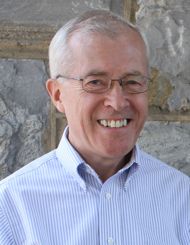Meet a Board MemberDecember 13, 2010
Rev. George Cottenden (M.Div. '67) Rev. Cottenden, recently retired minister of Trinity OPC in Hatboro, PA, is the stated clerk for the Orthodox Presbyterian Church General Assembly, and a Westminster alumnus ('67). Recently, we sat with him and asked a few questions about his experience at Westminster and how it has changed. Was there one person, or a couple of people, at Westminster that were particularly influential on you at that stage of your spiritual journey? I guess there were three, in three different ways. John Murray, certainly, with his approach to a thoroughly exegetically based systematic theology. Paul Wooley, just because he was such an interesting lecturer, with his anecdotal way of dealing with church history. He had some stories that I still wonder, without his having been there, how he didn’t make them up! But he was just fascinating. I’ve had a lifelong interest in Church history. Most of the reading I’ve done in the last few years that wasn’t related directly to the work I was doing at the time, has been in the area of Church history. And then, there was Ed Clowney. His emphasis on preaching Christ, I think, shaped my preaching ministry the way nothing else could have. The one thing that has always stuck with me [in Dr. Clowney's book Called to the Ministry] is the priority of the call to the ministry over other callings. How has Westminster changed since you were a student here? In terms of fundamental commitment to the Reformed faith and to a high doctrine of scripture, I think Westminster is exactly where it has always been. The board and the faculty are committed to the Bible as the Word of God, the infallible, fully inspired Word of God. That hasn’t changed. That sets the context for all that we do. This school has built on that. As it’s gotten larger, as it’s reached out to a more diverse community, it has addressed more of the consequences, the “so what?” of those positions. Back when I was a student at Westminster, the whole idea of a large practical theology department was looked at askance, because it was thought that that wasn’t something you teach. You provide the grounding in the Word of God, the grounding in systematic theology, the grounding in apologetics, and then you go out and learn in the church how to be a pastor. We came to recognize, sadly we had to recognize, that the church isn’t always equipped to do the kind of training that the church ought to be doing, and so the Seminary has taken up the slack with more emphasis on Practical Theology. The focus on counseling, of course, was a new addition. Jay Adams was just getting started during the early years of my ministry in New Jersey. In fact, I came down here and took the second or third training course that he offered in Hatboro. That was where CCEF had its counseling program at the time. In terms of the foundational commitment to the scriptures as the Word of God, and the foundational commitment to the Reformed faith as expressed in the Westminster Confession and Catechisms as being faithful exposition of the Word of God, I see the seminary as exactly where it’s always been. What words of encouragement do you have for our students and prospective students, knowing what you know now? I would encourage people to recognize that it is Christ who builds his church. So often a pastor, particularly, will get the idea that it all depends on him. I’m always encouraged by the fact that the Lord used a pagan sea captain to tell Jonah to pray. The Lord can take very imperfect instruments and use them to accomplish His purposes. Pastors especially, but all Christians, need to recognize that. We ought not to not think too highly of ourselves or what we’re doing, or act as if we are the lynchpin that holds everything together. It is Christ who builds his church. |






